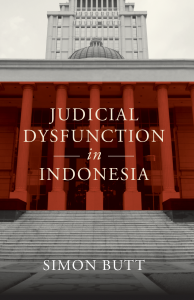Miscarriages of justice and judicial corruption in Indonesia
On Tuesday 19 February, AIIA NSW welcomed Professor Simon Butt to speak on judicial dysfunction in Indonesia. Professor Butt’s extensive history as a consultant on the Indonesian legal system and his experience as Professor of Indonesian Law and Associate Director of the University of Sydney’s Centre for Asian and Pacific Law have cemented his status as a leading authority on the topic.
Professor Butt’s address launched his latest book, Judicial Dysfunction in Indonesia, published by Melbourne University Publishing.

Butt began by outlining the country’s history of judicial corruption, as well as its continuous efforts to combat these issues. He highlighted the efforts of the Anti-Corruption Commission, which has tried and convicted almost 30 Indonesian judges for a range of offences. But the extent of judicial dysfunction was revealed in the fact that the single most common factor among these judges was the corruption charges they themselves faced. As the Indonesian saying goes: ‘You cannot sweep the floor with a dirty broom’.
Butt’s address focused on the Constitutional Court which, despite historically being considered the least dysfunctional of the state’s legal bodies, faced considerable controversy during the 2024 election. Much of this controversy centred around Gibran Rakabuming Raka, son of outgoing President Jokowi, running mate alongside soon-to-be president Probowo Subianto. On 16 October 2023, the Constitutional Court overturned a law prohibiting any candidate under the age of 40 from running. Butt relayed the confusing sequence of events in which three decisions made at the morning session of the court seemed to uphold this requirement, only for a fourth decision in the afternoon to state those under the age of 40 could run if they previously held public office (Gibran had been a provincial mayor).
This inconsistency, coupled with the fact that Chief Justice Usman, Jokowi’s brother-in-law, did not recuse himself from the proceedings despite the conflict of interest, reveals deep dysfunction within the court. Butt considered that the Constitution could no longer ensure electoral democracy: Probowo could amass incontestable power and might well reverse the post-1990 political reforms. While Probowo has attempted in recent years to soften his image with Javanese dance moves and “gemoy” (cute demeanour), he has historically embraced nationalist and anti-democratic narratives.
Butt highlighted how a 2020 parliamentary decision to increase the legal tenure of judges was hijacked to remove a judge the body had previous disagreements with, setting a worrying precedent. This judge was replaced with Guntur Hamzah, who consistently worked to remove the 40-year age limit for presidential and vice-presidential office even before the final decision on October 16, and was previously tried for doctoring evidence. Butt remarked that by signing the 2020 decision the court essentially signed its own death warrant.
He outlined the way convictions of an Australian woman for fatally poisoning one of her friends and of a Canadian teacher for child sexual offences had demonstrated the cavalier attitude of the courts to rules of evidence and legal process.
Questions from the audience were largely focused on the extent of corruption throughout the Indonesian legal and business system. When asked whether 30 convicted judges in a system with over 7,500 legal professionals was truly a sign of systemic dysfunction, Butt replied that these convictions should be considered the tip of the iceberg. He acknowledged that there were probably many legal professionals in Indonesia who operated to the highest level of moral integrity and professionalism. But his experience studying the system revealed deeply rooted systemic issues.
Asked whether increasing judges’ pay would lessen the prevalence of corruption, Butt responded that Indonesian judges have seen two increases in pay above market standard in the last two decades, to little effect. When asked how Asian powers like Japan and China were able to operate so effectively within Indonesia’s legal system, Butt commented that this was not exclusive to Asian countries. The UK, for example, undertakes an immense level of business in Indonesia. Butt argued Australia’s difficulties may be the result of poor large-scale investment plans but also the unwillingness of many Australian contractors to work within dysfunctional Indonesian legal parameters.
Report by Adam Scislowski, AIIA NSW intern

From L to R: AIIA NSW president, Ian Lincoln, Adam Scislowski and Professor Simon Butt
